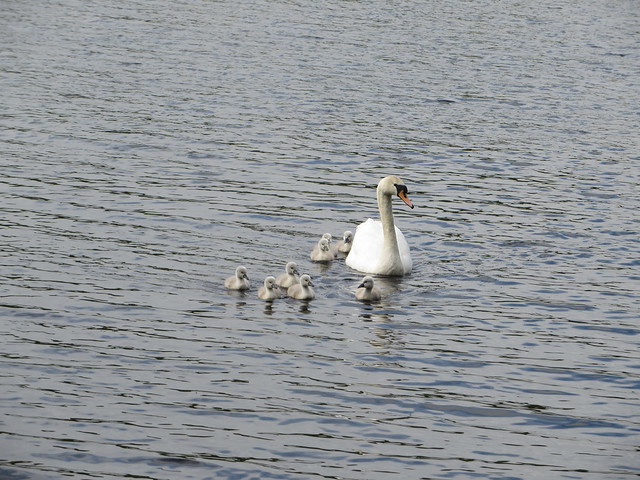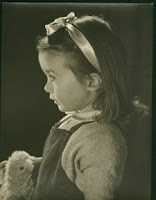It's a strange phenomenon, the power of Christmas Eve to resurrect memories so strongly and yet so randomly. As I listened to the first of the closing voluntaries from the Service of Nine Lessons and Carols from King's, there came into my mind a memory of myself, in my late teens, stricken with some inconvenient malady on Christmas Eve and spending that short afternoon in bed with the radio on, drifting in and out of sleep. I can't remember what ailed me, and cannot think it lasted, but at the time it felt unreal and solitary as the day darkened.
The small me in the photo (I think I was two) lived in blue dungarees and had to be coaxed out of them for family Christmas tea. (The yellow duck didn't join us - his red felt beak was too chewed for respectable company). We ate Christmas lunch, I remember clearly, in our top flat in Novar Drive, Hyndland, and went for tea to my grandparents' house in Hyndland Road. The whole extended family - the Stewarts, that is - would turn up there at some point in the day, though as I was the first of my generation I was the sole child for the first few post-war years. Families tended to live close, and there was public transport for those who were beyond walking distance.
I was remembering this morning how in my early married life I didn't do any Christmas food: my parents' house was ten minutes' walk from our flat (still in Hyndland) and we went there for lunch and stayed, stupefied, until it was time for bed. My first ever Christmas cake was made just before I had my first child - I'm sure I've recounted how, having slipped on ice in Clarence Drive, I had such a sore behind that I couldn't sit down, and dispelled my fears by baking. But the Glasgow Christmasses didn't end with our emigration to Dunoon; Cal Mac ferries seem to me to have run on Christmas Day and we headed back to Glasgow with our baby son. I do recall, however, that on the first year in Dunoon I iced the cake just before heading out to Midnight Mass: for the first time in my life I was attached to a church and had singing to do.
The long years of running Christmas myself occupied the greatest part of my life, having ended only five or six years ago. It still seems odd not to be making stuffing on Christmas Eve, and ramming it into a recalcitrant bird before church, odd not to waken to the smell of cooking and worry that the overnight temperature had been too high - or too low if the smell wasn't making it as far as the bedroom. There are no small children for whom stockings will have to be filled. I no longer have the restless wait for all the grown-up family to be safely here, nor the unholy rush between the end of term and the 25th. There is, theoretically, all the time in the world.
Time, in fact, to miss family; to look forward to seeing some and regret not seeing others; to have a suitcase packed and worry about taking the right things or forgetting presents or cooking brandy. Time to think about having dinner so that we can have a proper rest before our midnight sing/play/pray
(have I got the intercessions? the music?) Time to wonder how we ever had the energy to drag sleeping choristers from their beds to come with us (really).
Now these choristers are cooking turkeys, looking after young children, preparing for visitors, in different parts of the country, and we are here, with the dark firth calm at last and the rain peppering the windows. Everything changes but the message of that distant birth. Even the carols - tonight our introit will be
Advent Song, which is only four years old. And then Advent will be over, the waiting over.
And it will be Christmas.











